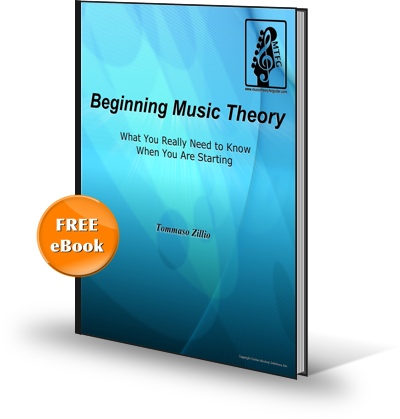Beginning Music Theory

Are you a complete beginner in music theory? Maybe you are wondering what the fuss about music theory is all about? Are you asking yourself what you will get out of understanding music theory?
The reality is that all of us would like to be able to play completely by ear — to be able to play instantly that melody that sings in your head (or heart). At first sight all these formulas and concepts that music theory has to offer seems just to restrict your creativity. Or at least that was I was feeling when I was just a beginner in music theory. What I have found, though, is quite the opposite of what I thought at the beginning. If studied properly, music theory is liberating, not constricting. It is not a set of "rules" as some people seem to think: it is a collection of structures that explains the connection between the emotional impact of music and the actual notes that are played.
In fact, if you are not familiar with the basic structures of music theory, you will repeatedly run into a series of problems, such as:
- Fumbling around to play something that "more or less" fits with the song
- "Chasing" the right note as opposed to "knowing" what is the right note that you hear in your mind.
- Simply having no idea where to start from when composing a song or writing a solo
So, what can we do? The first thing is to understand that music theory is not a set of rigid rules that you have to follow otherwise the "music theory police" will arrest you. Music theory is the accumulation of experience of many composers of the past. As such, it is a collection of "guidelines" that help us connect the emotion that we want to convey in our music. For instance, a song composed in the major key will communicate a happier feeling than a song composed in the minor key.
Let me give you a couple of examples.
- If you know the chords that go with a specific key, you can compose in an easier way. In the majority of the cases, the sound that you are searching is one of the chords in the key — at the very least you can try them before trying any other chords and I assure you that in 95% of the cases the chords of the key are the sound you are searching for.
- In the same way, knowing the notes in a chord gives you a preferential choice of notes to play over that chord. Some notes will sound "nice"over the chord. Some other will sound "unstable". Other will "clash" with the chord. Music theory does not tell you that you have to sound "nice", rather it shows you what to do when you want to sound nice, and what to do when you do not want to sound nice. The choice is yours! I leave the details of this topic to my guide for beginners in music theory (see below)
To help you learning these structures and especially to allow you to train them until you can use them without thinking too much, I have prepared a guide that does explain in a simple way all the concepts that a beginner in music theory needs to understand. It shows the main structures of music (keys, chords) and how to use them in practice. It also shows how chords and melodies (such as solos) are connected together.
 This guide will help you to get a great start in your learning. All the concepts explained do not
require that you have any previous knowledge (hey, it’s a beginner guide!) and yet they are ALL
immediately useful for you right now. We will not waste your time with things you are not
going to use!
This guide will help you to get a great start in your learning. All the concepts explained do not
require that you have any previous knowledge (hey, it’s a beginner guide!) and yet they are ALL
immediately useful for you right now. We will not waste your time with things you are not
going to use!
The guide contains a complete section on how to insert the concepts you have just learned into your practice routine. The section contains helpful tips on memorization and a training program that you can personalize to make your learning process faster and easier. You will be amazed how these simple suggestions will allow you to move from absolute beginner in music theory to confident player in a little time.
Finally, included in the beginner music theory guide is an appendix containing tables of all the notes in every chord and scale, and all the chords in every major or minor scale. These tables are a great timesaver for a beginner!
